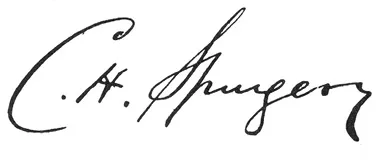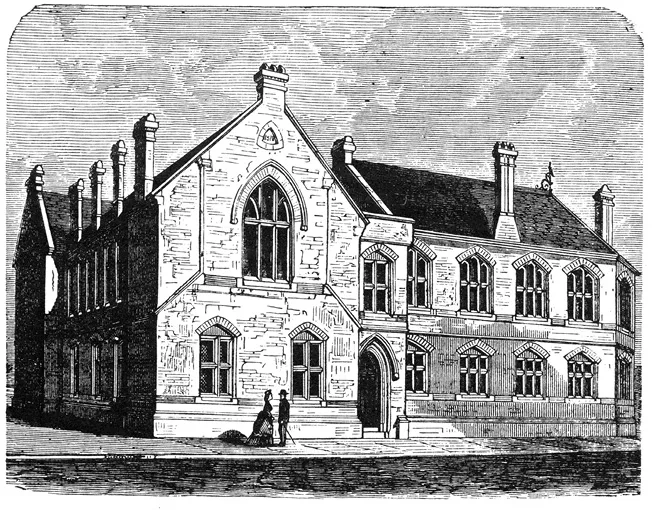![]()
Lectures to My Students
Practical and Spiritual Guidance for Preachers
Volume 1
![]()
Contents
About the Pastor’s College
Introduction and Apology
Ch. 1: The Minister
Ch. 2: The Call to Ministry
Ch. 3: Our Private Prayer
Ch. 4: Our Public Prayer
Ch. 5: Sermons
Ch. 6: Choosing a Text
Ch. 7: On Spiritualizing
Ch. 8: Your Voice
Ch. 9: Keeping Their Attention
Ch. 10: Impromptu Speech
Ch. 11: The Preacher’s Fainting Fits
Ch. 12: The Preacher’s Ordinary Conversation
Ch. 13: Your Library
Charles H. Spurgeon – A Brief Biography
Other Similar Titles
See other purchase options for this title online
![]()
About the Pastor’s College
The Pastor’s College began on a very small scale in the year 1856. Since that date, it has educated and sent forth into the ministry not less than 350 men, of whom, after deductions by death and other causes, about 300 remain in the Baptist denomination, preaching the gospel of Jesus Christ. In addition to this, a far larger number of men receive gratuitous education in the evening, training them to be city missionaries, suppliers of religious books, or useful private Christians.
The institution receives no man in order to make him a preacher, but was established to help further the education of brethren who have been preaching with some measure of success for two years at the least. Many men of earnest spirit and established Christian character are hindered in their efforts to do good by the meagerness of their knowledge. Conscious of their own defects, they endeavor to improve themselves, but in the absence of a guide, their need of books and their lack of time prevent their progress. These are the men whom the Pastor’s College welcomes. Men in whom piety, zeal, and the indwelling Spirit are to be found need not fear refusal at our doors on account of poverty, if they possess those gifts of utterance which are essential to the preacher.
The college aims at training preachers rather than scholars: to develop the faculty of ready speech, to help them understand the Word of God, and to foster the spirit of consecration, courage, and confidence in God. These objects are so important that we put all other matters into a secondary position. If a student should learn a thousand things and yet fail to preach the gospel acceptably, his college course will have missed its true design. Should the pursuit of literary prizes and the ambition for classical honors so occupy his mind as to divert his attention from his lifework, they are perilous rather than beneficial. To be wise in winning souls is the wisdom ministers should possess.
In the Pastor’s College, definite doctrines are held and taught. We hold by the doctrines of grace and the old orthodox faith and have no sympathy with the countless theological novelties of the present day, which are novelties only in outward form; in substance they are repetitions of errors exploded long ago. Our standing in doctrinal matters is well known, and we make no profession of carte-blanche charity, yet we find no failure in the number of earnest spirits who rally to our standard, believing that in truth alone can true freedom be found.
The support of the college is derived from the freewill offerings of the Lord’s people. We have no roll of subscribers, although many friends send us aid at regular intervals. Our confidence is that God will supply all our needs, and He has always done so heretofore. The president of the college has never derived a farthing from the work for himself in any shape, but, on the contrary, delights to give to the work all that he can, both of money and free service. Therefore, he confidently appeals to others to assist him in maintaining the institution. No work can possibly bestow a greater benefit upon mankind than the training of ministers whom God has chosen, for around them spring up churches, schools, and all the agencies of religion and philanthropy. As we are commanded to pray for laborers in the Lord’s harvest, so are we bound to prove the honesty of our prayers by our actions.
C. H. Spurgeon
Nightingale Lane
Clapham, Surrey, England
![]()
Introduction and Apology
In reply to many requests from those ministers who in their student days listened to my lectures, I submit a selection to the press. This, however, I cannot do without an apology, for these addresses were not originally prepared for the public eye and are scarcely presentable for criticism.
My college lectures are colloquial, familiar, full of anecdote, and often humorous; they are purposely made so to suit the occasion. At the end of the week, I meet the students and find them weary with sterner studies, and I judge it best to be as lively and interesting in my lectures as I can be. They have had their fill of classics, mathematics, and divinity, and are only in a condition to receive something which will attract and secure their attention and fire their hearts. Our tutor, Mr. Rogers, compares my Friday work to the sharpening of the pin. The fashioning of the head, the straightening, the laying on of the metal, and the polishing have been done during the week. The process concludes with an effort to give point and sharpness. To succeed in this, the lecturer must not be dull himself nor demand any great effort from his audience.
I am as much at home with my young brethren as in the bosom of my own family. Therefore, I speak without restraint. Generous minds will take this into account in reading these lectures, and I shall hope that all who favor me with their criticisms will be of that noble order.
Possibly, cutting remarks may be made upon my frequent references to myself, my own methods of procedure, and my personal reminiscences. These also were intentional. I have purposely given an almost autobiographical tinge to the whole because my own experience, such as it is, is the most original contribution I can offer my own students, which is as weighty as any other within my reach. It would have been impossible for me to quote the experiences of other men if they had not been bold enough to record them, and I make an honest attempt to acknowledge my debt to my greater predecessors by writing down my own experiences. Whether this arises from egotism or not, each reader shall decide according to the sweetness or acidity of his own disposition. A father is excused when he tells his sons his own life story and finds it the readiest way to enforce his maxims; the old soldier is forgiven when he shoulders his crutch and shows how fields were won. I beg that the license which tolerates these may, on this occasion, be extended to me.
It would have saved me much labor had I reserved these lectures for redelivery to new companies of freshmen, and I am conscious of no motive in printing them but that of desiring to keep my counsels alive in the memories of those who heard them years ago and impressing them upon others who dwell beyond the precincts of our classroom. The age has become intensely practical and needs a ministry, not only orthodox and spiritual, but also natural in utterance and practically shrewd. Officialism is sick unto death; life is the true heir to success and is coming to its heritage. Mannerisms, pomposities, and proprieties, once so potent in the religious world, are becoming as obsolete in the reverence of men as those gods of high Olympus, for whom in past ages poets tuned their lyres, and sculptors quickened marble into beauty. Truth and life must conquer, and their victory is nearest when they cease to be encumbered with the grave clothes of conventionalism and pretense. It is delicious to put one’s foot through the lath and plaster of old affectations in order to make room for the granite walls of reality. This has been a main design with me, and may God send success to the effort.
The solemn work with which the Christian ministry concerns itself demands a man’s all, and that all should be at its best. To engage in it halfheartedly is an insult to God and man. Slumber must forsake our eyelids sooner than men shall be allowed to perish. Yet we are all prone to sleep as do others, and students, among the rest, are apt to act the part of the foolish virgins. Therefore, I have sought to speak out my whole soul in the hope that I might not create or foster dullness in others. May He, in whose hand are the churches and their pastors, bless these words to younger brethren in the ministry, and if so, I shall count it more than a full reward and shall gratefully praise the Lord.
Should this publication succeed, I hope very soon to issue in similar form a work upon commentating, containing a full catalogue of commentaries and a second set of lectures. I shall be obliged by any assistance rendered to the sale, for the price is not remunerable, and persons interested in our subjects are not numerous enough to secure a very large circulation. Hence, it is only by the kind aid of all appreciating friends that I shall be able to publish the rest of the contemplated series.
Register This New Book
Benefits of Registering*
- FREE replacements of lost or damaged books
- FREE audiobook – Pilgrim’s Progress, audiobook edition
- FREE information about new titles and other freebies
www.anekopress.com/new-book-registration
*See our website for requirements and limitations.
![]()
Lecture 1
The Minister
Take heed unto thyself, and unto the doctrine. (1 Timothy 4:16)
Every workman knows the necessity of keeping his tools in a good state of repair, for if the iron be blunt, and he do not whet the edge, then must he put [forth] more strength. If the workman loses the edge on his axe, he knows there will be a greater pull upon his energies, or his work will be badly done.
Michelangelo, the best in the fine arts, understood so well the importance of his tools that he always made his own brushes with his own hands, and in this he gives us an illustration of the God of grace, who with special care fashions for Himself all true ministers. Like Quentin Matsys in the story of the Antwerp school, the Lord is able to work with the faultiest kind of instrumentality, as He does when He occasionally makes very foolish preaching to be useful in conversion. He can even work without agents, as He does when He saves men without a preacher at all, applying His Word directly by His Holy Spirit; but we cannot regard God’s absolute sovereign acts as a rule for our action. He may, in His own sovereignty, do as He pleases, but we must act as His clearer dispensations instruct us.
One of the clearer facts is that the Lord usually adapts means to ends, from which the plain lesson is that we are likely to accomplish most when we are in the best spiritual condition. In other words, we shall usually do our Lord’s work best when our gifts and graces are in good order, and we shall do our worst when they are most out of order. This is a practical truth for our guidance; when the Lord makes exceptions, they do but prove the rule.
We are, in a certain sense, our own tools, and therefore must keep ourselves in order. If I want to preach the gospel, I can only use my own voice, and so I must train my vocal powers. I can only think with my own brains and feel with my own heart; therefore, I must educate my intellectual and emotional faculties. I can only weep and agonize for souls in my own renewed nature; therefore, I must watchfully maintain the tenderness which was in Christ Jesus. It will be in vain for me to stock my library or organize societies or project schemes if I neglect the culture of myself; for books and agencies and systems are only remotely the instruments of my holy calling. My own spirit, soul, and body are my nearest machinery for sacred service; my spiritual faculties and my inner life are my battle-axe and weapons of war. M’Cheyne, writing to a ministerial friend who traveled with a goal of perfecting himself in the German tongue, used language identical with our own:
I know you will apply hard to German, but do not forget the culture of the inner man – I mean of the heart. How diligently the cavalry officer keeps his sabre clean and sharp; every stain he rubs off with the greatest care. Remember you are God’s sword, his instrument – I trust, a chosen vessel unto him to bear his name. In g...



